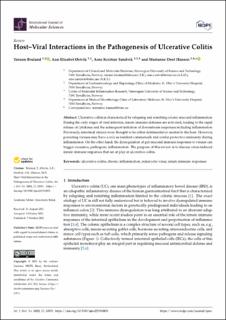Host-Viral Interactions in the Pathogenesis of Ulcerative Colitis
Peer reviewed, Journal article
Published version

Åpne
Permanent lenke
https://hdl.handle.net/11250/2992736Utgivelsesdato
2021Metadata
Vis full innførselSamlinger
- Institutt for klinisk og molekylær medisin [3587]
- Publikasjoner fra CRIStin - NTNU [38688]
- St. Olavs hospital [2577]
Originalversjon
10.3390/ijms221910851Sammendrag
Ulcerative colitis is characterized by relapsing and remitting colonic mucosal inflammation. During the early stages of viral infection, innate immune defenses are activated, leading to the rapid release of cytokines and the subsequent initiation of downstream responses including inflammation. Previously, intestinal viruses were thought to be either detrimental or neutral to the host. However, persisting viruses may have a role as resident commensals and confer protective immunity during inflammation. On the other hand, the dysregulation of gut mucosal immune responses to viruses can trigger excessive, pathogenic inflammation. The purpose of this review is to discuss virus-induced innate immune responses that are at play in ulcerative colitis.
